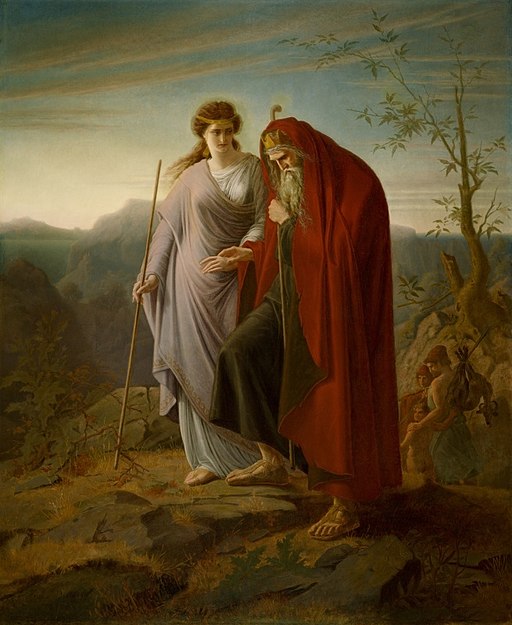Spiritual Sunday
Perhaps it is because we are in Lent, but the lectures I am giving in Ljubljana all lead back to suffering and transcendence. This has been true of my Flannery O’Connor and James Baldwin lectures (here and here), and currently I am exploring my friend Mladen Dolar’s idea that Sophocles’s Oedipus at Colonus works as a sequel to King Lear,
In “Sonny’s Blues,” I see Sonny as a Christ figure, taking upon himself the world’s suffering and offering us a road to transcendence. Note, first of all, how the agony he goes through echoes Jesus’s struggle in the Garden of Gethsemane:
He and the piano stammered, started one way, got scared, stopped; started another way, panicked, marked time, started again; then seemed to have found a direction, panicked again, got stuck. And the face I saw on Sonny I’d never seen before. Everything had been burned out of it, and, at the same time, things usually hidden were being burned in, by the fire and fury of the battle which was occurring in him up there.
But because Sonny undertakes the challenge, he offers us a vision of freedom:
I seemed to hear with what burning he had made it his, and what burning we had yet to make it ours, how we could cease lamenting. Freedom lurked around us and I understood, at last, that he could help us to be free if we would listen, that he would never be free until we did. Yet, there was no battle in his face now, I heard what he had gone through, and would continue to go through until he came to rest in earth. He had made it his: that long line, of which we knew only Mama and Daddy. And he was giving it back, as everything must be given back, so that, passing through death, it can live forever.
After I gave the lecture, one student, dissatisfied with the story’s ending, asked whether it wasn’t possible that Sonny would return to drugs. I agreed this could happen and that indeed (as the story notes) the jazz performance “was only a moment, that the world waited outside, as hungry as a tiger, and that trouble stretched above us, longer than the sky.” Yet perhaps this is what Jesus means by the kingdom of God: transcendent moments where we break through the darkness and experience the divine face to face.
That is O’Connor’s vision in “A Good Man Is Hard to Find.” She “would of been a good woman. if it had been somebody there to shoot her every minute of her life” because in her encounter with a serial killer she experiences a selfless love. In her death we see her having achieved peace, with
her legs crossed under her like a child’s and her face smiling up at the cloudless sky.
The alternative is The Misfit’s mental box, symbolically captured by his description of life in a prison cell:
“Turn to the right, it was a wall,” The Misfit said, looking up again at the cloudless sky. “Turn to the left, it was a wall. Look up it was a ceiling, look down it was a floor. I forget what I done, lady. I set there and set there, trying to remember what it was I done and I ain’t recalled it to this day. Oncet in a while, I would think it was coming to me, but it never come.”
Imagine King Lear’s life had Cordelia offered up an empty declarations of love rather than insisting on the real thing. Lear would have partied with his knights in the King of France’s father-in-law apartment and died the same self-absorbed man that he had lived. Instead, through love, he rose to a transcendent state, his suffering of no account.The few hours that he spends with Cordelia are worth more than his entire life. Contrast his prison experience to The Misfit’s:
Come, let’s away to prison:
We two alone will sing like birds i’ the cage:
When thou dost ask me blessing, I’ll kneel down,
And ask of thee forgiveness: so we’ll live,
And pray, and sing, and tell old tales, and laugh
At gilded butterflies, and hear poor rogues
Talk of court news; and we’ll talk with them too,
Who loses and who wins; who’s in, who’s out;
And take upon’s the mystery of things,
As if we were God’s spies: and we’ll wear out,
In a wall’d prison, packs and sects of great ones,
That ebb and flow by the moon.
At the end of Colonus, Oedipus emerges after years of wandering blind in the wilderness to offer up a message of love to daughters Antigone and Ismene:
My children, from this day
You have no father. All is passed away
That once was mine or me, and all the sore
Toils of my tendance shall be yours no more;
Hard toils, I know well; yet one word there is
That maketh light your heaviest services.
Love I have given you, such as none beside
Could give.
He delivers the same message in his final moments:
Deep silence fell; then on the silence brake
A great voice calling. All our hearts did shake
With fear and our hair stiffened, for all round
Like many divine voices, rose that sound:
“Ho Thou! Thou Oedipus! Why do we stay
Our goings? All too long is thy delay.”
He heard, and, hearing, knew God’s summons clear.
Straightway he called that Theseus be brought near,
And when he came, “O friend,” he cried, “in troth
Give me thy right hand—man’s most ancient oath—
Clasp it, my daughters!—never to forsake
These twain but act in all things for their sake
As love will prompt.”
Sophocles wrote Colonus when he was 90 years old. He had seen Athens at its height and also on the verge of its final catastrophe. “Love” was the message he left us with.
